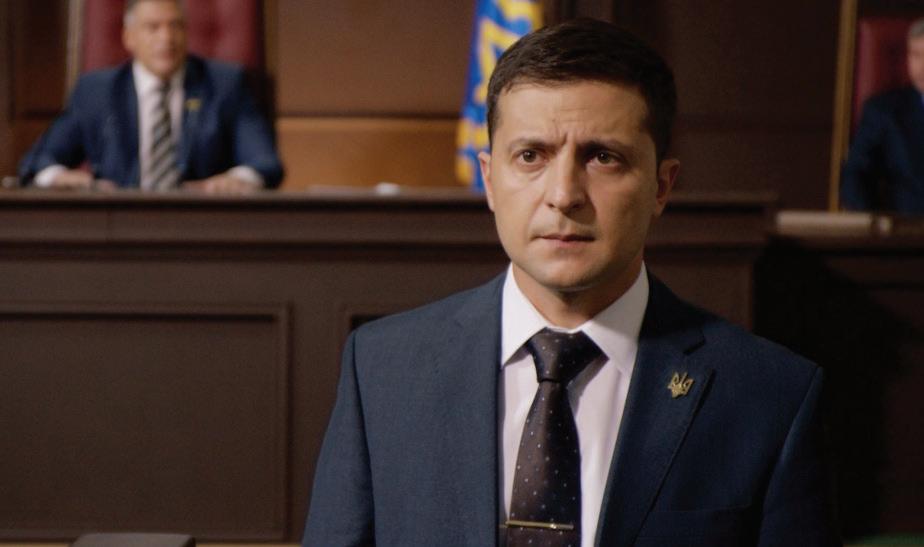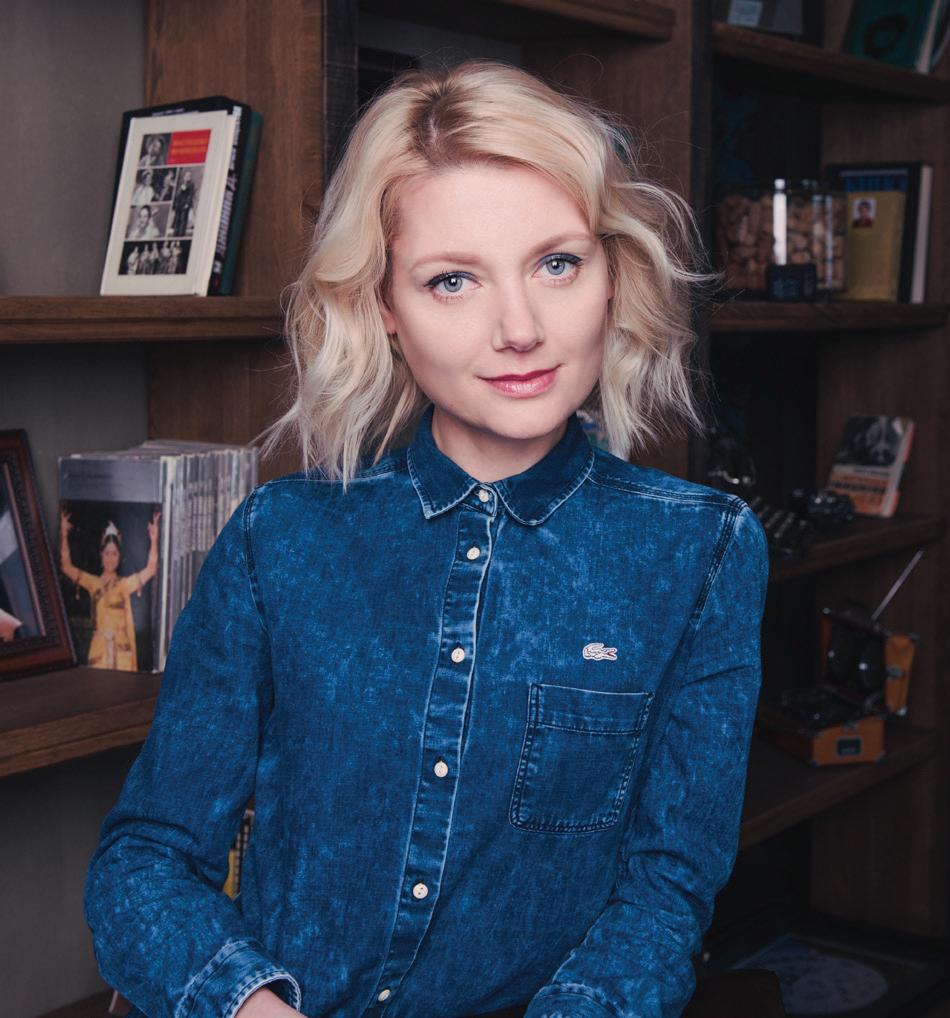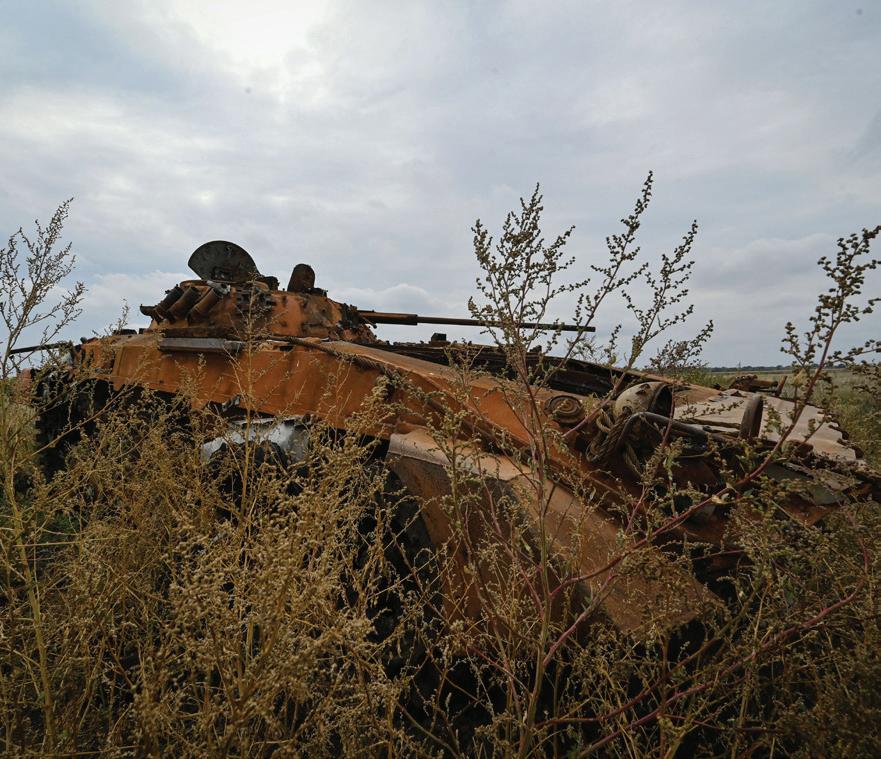
8 minute read
FIGHTING FOR SURVIVAL
Left: President Volodymyr Zelenskyy in Servant of the People; below: Kateryna Vyshnevshka.
THE BATTLE FOR THE SMALL SCREEN

How Ukraine’s film and television sectors are striving to rebuild their business in the face of war
By Max Goldbart
“When life gives you lemons, make lemonade,” declares Kateryna Vyshnevska, with a small smile on her face. The FILM.UA exec Vyshnevska, the architect behind the $20 million Ukrainian Content Club, is rifling through old emails from that now history-defining week that started with the Russian invasion of Ukraine on February 24.
She is amazed to see that in just days she was already part of a taskforce focusing on how to get “significant and cultural” Ukrainian projects to screen.
“There was a moment when all of us just froze,” Vyshnevska tells Deadline. “There was a lot of anger, but that anger was quickly channelled in the right direction. We realized that if we couldn’t tell the stories that matter, then [the Russians] have already won.”
For many in the Ukrainian TV and film industry, it is hard to believe the devastating war has been raging for more than eight months.
Key figures in a sector that was previously blossoming had their entire lives turned upside down overnight. Some have left the embattled nation and others have adapted to a new normal that has, for the moment, upended the way in which projects are funded and brought to screen.
The swift action described by Vyshnevska is reflective of the innovation and out-of-the-box thinking that has characterized Ukrainian culture over the past months, with a slew of challenges needed to be overcome.
“When war broke out, it felt like everyone was prepared and yet at the same time not ready at all,” remembers Yaroslav Pakholchuk, CEO of 1+1 Media, Ukraine’s largest media group.
With only circa-10% to 15% of staff “completely dedicated to the job” in the days after the invasion, 1+1 and a trio of other major broadcasters took an approach akin to Maslow’s hierarchy of needs, says Pakholchuk, quickly pivoting their services in what would normally have taken weeks of planning.
“This was about how to survive, keep signal and deliver news to the West and Ukraine,” he says. “We made our decisions quickly and with no limits, obligations or commitments.”
The result was United News, a roundly praised 24/7 news service that has brought together the might of 1+1, StarLight Media, Media Group Ukraine and Inter Media Group. It is still in operation today.
For those first few weeks, the competitors cooperated without complaint, eschewing traditional competition to operate with a rotating roster of presenters from each of the four broadcast groups complemented by the work of international news services such as the BBC.
United News delivers crucial information to those most in need, although Pakholchuk says Ukraine’s geographical enormity means viewers based thousands of miles from where the war is raging have grown frustrated with the round-the-clock content.
Keeping audiences engaged beyond the news has been tricky and Pakholchuk’s 1+1 has struggled financially, only starting to pick up some investment from donors following a funding drive in July.
This inability to attract domestic funding has been the biggest obstacle to rebuilding the industry, according to many Deadline heard from, including filmmaker and Series Mania 2022 Jury President Julia Sinkevych.
“People are doing the best they can to maintain an industry that can’t really be called an industry at present,” says Sinkevych, who was in postproduction on feature doc Lucky Girl when Russia invaded. “Everything feels on hold,” she adds.
Budgets have understandably been diverted from culture to the military, says Sinkevych, and, away from the small screen, the Ukrainian Film Agency has struggled to raise funding as cinema numbers have dipped dramatically, with citizens unwilling to return through fear of being hurt or caught in a raid. With the advertising sector collapsing and staff numbers down 25%,
Pakholchuk audited all of 1+1’s projects for a six-to-nine-month period and had to be extremely selective, with staff taking pay cuts for several months.
Documentaries have been a focus and, to mark both Ukrainian Independence Day and the six month anniversary of the war, the likes of Mariupol Unlost Hope aired across Ukrainian TV channels and abroad, while 1+1 has also hosted charity telethons and football matches.
“The most difficult thing is production,” explains Pakholchuk. “Before the war we could recover 50% to 60% of a $100,000 budget through advertising but now it’s virtually nothing. So, how do we cover that cost?”
To solve this conundrum, the Ukrainian industry has turned to the west and, in many cases, the call has been answered.
Driven by a President who used to be the star of Servant of the People—a now globally-popular sitcom—the last few months have seen what could best be described as the speeding up of an ‘internationalization’ of the Ukrainian sector, one that Media Resources Management CEO Kateryna Udut says began with the 2014 annexation of Crimea.
“After 2014, the market changed dramatically as we stopped cooperating with the Russians,” she says. “We used to have one common market but that market has moved westwards and the whole world is now open to us.”
This has conversely had a negative impact on the Russian TV and film industry, says Den Tolmor, Academy Award-nominated producer of Netflix’s Winter on Fire: Ukraine’s Fight For Freedom, who says that prior to 2013, Russia was making roughly 25% to 30% of its projects in Ukraine and selling many into the territory.
The likes of Udut, Vyshnevska and Sinkevych have led the charge in Ukraine’s mega international funding drive over the past months and have attended multiple film festivals, TV markets and conferences extolling the virtues of Ukrainian content and will be present with a pavillion at Mipcom.
Leading the way has been the Ukrainian Content Club, a lofty initiative that Vyshnevska has been shopping in LA to the biggest global studios and streamers. The scripted, drama, animation and factual fund, which operates as a charity, is seeking investment for projects early in the production process in order to get them to screen, and these projects will be unveiled in the coming months.
Vyshnevska, who is producing a series for Red Arrow Studios International about those who stayed in Kyiv at the start of the war, hopes the initiative will show Ukraine as a nation where “adversity has led to creativity”.
“Necessity is the mother of invention. You become better filmmakers when you have to figure out solutions to martial law, curfews and sirens.”
Vyshnevska has been bowled over by global support and says the growing Ukrainian refugee population has made this support even more necessary. Almost one-tenth of Poland’s population is currently comprised of Ukrainian refugees, while resettlement schemes have been implemented in the UK, France and Germany, among others.
“There are 10 million Ukrainians spread across Europe and they have to be addressed,” she says. “Project financing has been helped by the appetite for Ukrainian stories from people who have welcomed refugees into their home.”
Sinkevych is also Chairwoman of the Ukrainian Institute’s Supervisory Board, which is responsible for cultural diplomacy, and she says the Institute has pivoted strategy recently to not only promote Ukrainian culture but also explain why it is so necessary to overcoming conflict.
Russian activity at film events has been a consistently thorny issue, and the Ukrainian Institute has criticized festivals like Cannes for including Russian titles like Kirill Serebrennikov’s Tchaikovksy’s Wife, which was funded by Russian oligarch Roman Abramovich.
“There is no independent filmmaking in Russia, it’s that simple,” says Sinkevych. “We’ve been in conflict with Russia for eight years and I don’t recall any Russian films saying anything about the terrible acts being committed in Ukraine.”
Meanwhile, the Ukrainian Institute recently slammed an emergency German filmmaker program for “perpetuating an outdated Soviet perspective” by inviting Russians and Belarussians as well as Ukrainians, which Sinkevych says showed a “lack of understanding of historical context”.
But despite these teething problems, Sinkevych believes international support is crucial at the very least until the war ends, while the brains behind the Ukrainian culture industry work out a longer-term strategy that will get the sector back to something resembling the heady pre-war days.
For self-described optimist Tolmor, one cannot underestimate the importance of film and TV and, since the war broke out, he has overseen Ukrainian-shot comedy From Ukraine with Love and started prepping a feature inspired by Canadian ‘lone wolf’ sniper Wali provisionally titled The Good Fight, who spent two months fighting Russia in Ukraine.
“Hospitals, roads and schools will take years to rebuild so we need the production of local TV shows and movies to lift people’s spirits up,” he says. “They need to feel they live in a normal society, so my biggest goal is to help rebuild this industry [and put] it back on the map.” ★
THE VIEW FROM RUSSIAN DISSIDENT, AUTHOR, SCREENWRITER, AND JOURNALIST DMITRY GLUKHOVSKY
I was outside of Russia when war broke out and deciding to speak out took several seconds. I knew that I was likely denying myself a route back home but I was thinking of my friends in Ukraine, and pretending that nothing happened would be a direct betrayal of those who were sitting in their shelters in Kyiv under the Russian shelling. Now I am accused of “discrediting the Russian army” and am facing up to 15 years in jail.
In spite of the looming blockade and numerous sanctions imposed on Russia by the West, the biggest surprise to me after speaking with friends in Russia is that life in Moscow and St. Petersburg is disguised in normalcy. The restaurants are overcrowded, the pro-war symbols of ‘Z’ and ‘V’ have mostly vanished from the streets, and even the police presence has thinned out.
Any attempt to have an honest discussion of Russia’s real problems—authoritarianism, total corruption of the political elite, political murders, poverty of the population, growing ethnic tensions in Russia—is completely impossible. Moreover, the President’s administration has blacklisted creatives who spoke up against the war, and they’re being de facto banned from the profession, fired from productions and denied new jobs unless they publicly atone for their anti-regime statements and endorse the regime’s policy and propaganda. Even before war broke out, I saw my film projects closed down in Russia for speaking in support of opposition leader Alexei Navalny.
Putin has tried to make the nation complicit in this war. But when he’s gone, there will be no reason to pursue. ★






